- Home
- Medical news & Guidelines
- Anesthesiology
- Cardiology and CTVS
- Critical Care
- Dentistry
- Dermatology
- Diabetes and Endocrinology
- ENT
- Gastroenterology
- Medicine
- Nephrology
- Neurology
- Obstretics-Gynaecology
- Oncology
- Ophthalmology
- Orthopaedics
- Pediatrics-Neonatology
- Psychiatry
- Pulmonology
- Radiology
- Surgery
- Urology
- Laboratory Medicine
- Diet
- Nursing
- Paramedical
- Physiotherapy
- Health news
- Fact Check
- Bone Health Fact Check
- Brain Health Fact Check
- Cancer Related Fact Check
- Child Care Fact Check
- Dental and oral health fact check
- Diabetes and metabolic health fact check
- Diet and Nutrition Fact Check
- Eye and ENT Care Fact Check
- Fitness fact check
- Gut health fact check
- Heart health fact check
- Kidney health fact check
- Medical education fact check
- Men's health fact check
- Respiratory fact check
- Skin and hair care fact check
- Vaccine and Immunization fact check
- Women's health fact check
- AYUSH
- State News
- Andaman and Nicobar Islands
- Andhra Pradesh
- Arunachal Pradesh
- Assam
- Bihar
- Chandigarh
- Chattisgarh
- Dadra and Nagar Haveli
- Daman and Diu
- Delhi
- Goa
- Gujarat
- Haryana
- Himachal Pradesh
- Jammu & Kashmir
- Jharkhand
- Karnataka
- Kerala
- Ladakh
- Lakshadweep
- Madhya Pradesh
- Maharashtra
- Manipur
- Meghalaya
- Mizoram
- Nagaland
- Odisha
- Puducherry
- Punjab
- Rajasthan
- Sikkim
- Tamil Nadu
- Telangana
- Tripura
- Uttar Pradesh
- Uttrakhand
- West Bengal
- Medical Education
- Industry
A new blood test may detect leukemia risk and replace bone marrow sampling: Study

What if a blood test could reveal the pace of our aging-and the diseases that may lie ahead? The labs of Profs. Liran Shlush and Amos Tanay at the Weizmann Institute of Science have been conducting in-depth studies into the biology of blood to better understand the aging process and why some people become more susceptible to disease over the years. Their research teams, made up of physicians, biologists and data scientists, have been tracking changes in the blood-forming stem cells, including the emergence of genetic changes in these cells in about one-third of people over the age of 40. These changes not only increase the risk of blood cancers such as leukemia, but have also been linked to heart disease, diabetes and other age-related conditions.
In a new study published today (Friday) in Nature Medicine – just days after their labs were severely damaged in an Iranian missile attack – Shlush and Tanay present findings that may lead to an innovative blood test for detecting a person’s risk of developing leukemia. This test may potentially replace the invasive diagnostic procedure of bone marrow sampling.
The study focused on myelodysplastic syndrome (MDS), an age-related condition in which blood stem cells fail to properly mature into functional blood cells. Diagnosing MDS and assessing its severity is crucial, as it can lead to severe anemia and may progress to acute myeloid leukemia, one of the most common blood cancers in adults. Until now, diagnosis has relied on bone marrow sampling, a procedure that requires local anesthesia and can cause discomfort or pain.
In the new study, a research team led by Dr. Nili Furer, Nimrod Rappoport and Oren Milman, in collaboration with physicians and researchers in Israel and the United States, showed that rare blood stem cells – which occasionally exit the bone marrow and enter the bloodstream – carry diagnostic information about MDS. The researchers demonstrated that with a simple blood test and advanced single-cell genetic sequencing, it is possible to identify early signs of the syndrome and even assess a person’s risk of developing blood cancer.
The researchers also discovered that the migrating stem cells can serve as a clock for our chronological age, and that in males, their population changes earlier than in women in a way that increases the risk of cancer. This finding may explain the higher prevalence of blood cancers among men. The scientists believe that using the test to diagnose MDS and leukemia is only the beginning, and that in the future it could be applied to a range of other blood-related disorders. The current findings are already being tested in a large-scale clinical trial at several medical centers around the world.
In addition to his laboratory research, Shlush is also a senior physician at Assuta Medical Center in Ashdod and at Maccabi Healthcare Services, and he heads the newly established Miriam and Aaron Gutwirth Medical School at the Weizmann Institute. The school was founded to address the emerging needs and challenges of the worlds of medicine and research and to bridge, as much as possible, the gap between today’s science and tomorrow’s medicine. Unlike existing programs around the world that combine medicine with research, the new program is expected to unify and intertwine the clinical and research components. The school is scheduled to open its doors for the first time this coming October and aims to train the next generation of physician-scientists.
Reference:
Furer, N., Rappoport, N., Milman, O. et al. A reference model of circulating hematopoietic stem cells across the lifespan with applications to diagnostics. Nat Med (2025). https://doi.org/10.1038/s41591-025-03716-5.
Dr Kamal Kant Kohli-MBBS, DTCD- a chest specialist with more than 30 years of practice and a flair for writing clinical articles, Dr Kamal Kant Kohli joined Medical Dialogues as a Chief Editor of Medical News. Besides writing articles, as an editor, he proofreads and verifies all the medical content published on Medical Dialogues including those coming from journals, studies,medical conferences,guidelines etc. Email: drkohli@medicaldialogues.in. Contact no. 011-43720751


